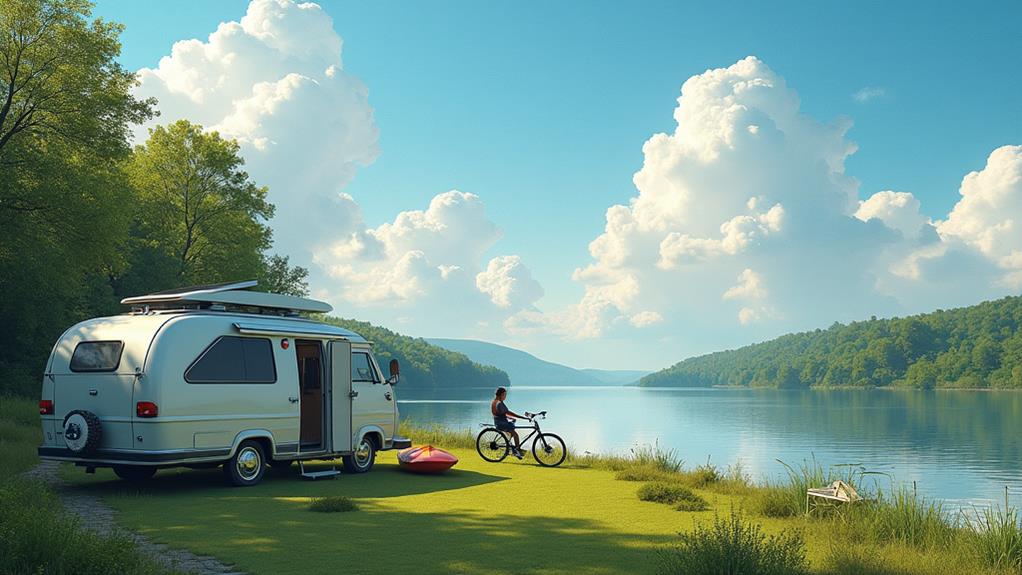As you prepare for your next RV adventure, you’re likely thinking about the freedom of the open road and the thrill of exploring new destinations. But have you considered the environmental impact of your travels? By making a few simple changes to your RV routine, you can greatly reduce your ecological footprint. Start by planning your route efficiently to minimize fuel consumption, and make sure your RV is well-maintained for peak performance. But that’s just the beginning – there are many more ways to reduce your RV’s environmental impact, and the benefits are well worth exploring further.
Summary
- Plan your route efficiently using online tools and apps to minimize fuel consumption and reduce environmental impact.
- Optimize your RV’s fuel efficiency by maintaining properly inflated tires, driving smoothly, and monitoring weight.
- Conserve water and energy by installing low-flow showerheads, using energy-efficient appliances, and implementing solar panels.
- Implement sustainable waste management by composting food waste, recycling, and minimizing paper and plastic use.
- Choose eco-friendly campsites and offset carbon emissions by investing in carbon offset programs or renewable energy options.
Plan Your Route Efficiently

As you prepare for your RV trip, planning your route efficiently is essential to reducing your carbon footprint. You can make a significant impact by mapping out your route in advance, considering the most direct paths to your destinations. However, don’t forget to leave room for scenic detours and local attractions that make RV travel so enjoyable. By balancing efficiency with exploration, you can minimize your environmental impact while still experiencing the freedom of the open road.
When planning your route, consider using online tools or apps that help you find the most fuel-efficient routes. You can also look for routes that take you through national parks or other protected areas, which often offer stunning scenery and opportunities to connect with nature. Additionally, be mindful of road conditions and construction, which can slow you down and decrease your fuel efficiency. By planning ahead and being mindful of your route, you can reduce your carbon footprint and enjoy a more eco-friendly RV trip.
Conserve Water on the Road
Every gallon of water counts when you’re on the road in your RV. Conserving water not only helps the environment, but it also reduces your water bills and extends your boondocking stays. To make a positive impact, you can start by installing water-saving gadgets in your RV, such as low-flow showerheads and toilets.
You can also adopt efficient showering habits to minimize your water usage. Here are a few tips to get you started:
- Take shorter showers by setting a timer or using a showerhead with a built-in timer.
- Turn off the water while soaping up or shampooing to reduce flow time.
- Use a showerhead with a flow rate of 2.5 gallons per minute or less.
Reduce Energy Consumption

Many of your RV’s systems rely on energy, making reducing energy consumption essential for an eco-friendly trip. You can start by investing in energy-efficient appliances, such as LED light bulbs and a power-saving refrigerator. These appliances use considerably less energy than traditional ones, reducing your carbon footprint and saving you money on fuel costs.
Another way to reduce energy consumption is to harness the power of the sun. Install solar panels on your RV to generate electricity and charge your batteries. This will not only reduce your reliance on fossil fuels but also give you the freedom to boondock without worrying about running out of power. You can also use portable solar panels to charge your devices and power small appliances. By making these simple changes, you’ll be able to enjoy the great outdoors while minimizing your impact on the environment. By choosing energy-efficient options, you’ll be one step closer to a more sustainable RV lifestyle.
Use Eco-Friendly Cleaning Products
Your RV’s interior can quickly become a breeding ground for bacteria and grime, especially after a long trip. You want to keep your home on wheels clean and hygienic, but harsh chemicals can harm the environment and your health. Switch to eco-friendly cleaning products that are gentle on surfaces and the planet.
You can easily find or make cleaning products using natural ingredients like baking soda, vinegar, and lemon juice. These alternatives are just as effective as commercial cleaners but without the toxic chemicals. Here are some options to evaluate:
- Castile soap for washing dishes and surfaces
- Essential oil-based disinfectants for a fresh, non-toxic scent
- White vinegar for cleaning countertops and mirrors
When shopping for cleaning products, look for biodegradable options that are free from phosphates, chlorine, and ammonia. These products are designed to break down naturally in the environment, reducing pollution and harm to wildlife. By making the switch to eco-friendly cleaning products, you’ll not only reduce your RV’s environmental impact but also create a healthier living space for yourself and your fellow travelers. Choose products that align with your values and love for the great outdoors.
Implement Sustainable Waste Management

As you travel through the great outdoors, managing waste effectively is essential to minimizing your RV’s ecological footprint. Implementing sustainable waste management practices not only helps preserve the natural beauty of your destinations but also reduces your impact on the environment.
You can start by adopting composting practices for food waste. Consider investing in a compact composting bin or a worm composter that can easily fit in your RV. This way, you can turn your food scraps into nutrient-rich soil that can be used for gardening or donated to local parks.
In addition to composting, take advantage of recycling programs available at campsites and RV parks. Many facilities now offer recycling bins for paper, plastic, glass, and metal. Make sure to sort your waste accordingly and participate in these programs. You can also reduce your waste output by choosing products with minimal packaging and buying in bulk. By implementing these simple yet effective waste management strategies, you’ll be able to enjoy the freedom of RV travel while doing your part to protect the environment.
Optimize Your RV’s Fuel Efficiency
When planning an eco-friendly RV trip, optimizing your RV’s fuel efficiency is essential to minimizing its carbon footprint. You can start by checking your tire maintenance. Properly inflated tires can improve your RV’s fuel efficiency, reduce tire wear, and decrease your carbon emissions.
Your driving habits also play a significant role in your RV’s fuel efficiency. Aggressive driving, such as speeding and rapid acceleration, can lower your gas mileage and increase emissions. Drive smoothly, maintain a moderate pace, and use cruise control on the highway to improve your fuel efficiency.
To optimize your RV’s fuel efficiency, consider these simple tips:
- Use a fuel-efficient driving technique: accelerate gradually and avoid braking hard.
- Maintain a healthy weight: extra pounds can decrease fuel efficiency and increase emissions.
- Monitor your fuel efficiency: use a fuel log to track your gas mileage and stay on top of maintenance needs.
Choose Eco-Friendly Campsites
Campsites can greatly impact the environment, so selecting an eco-friendly one is essential for minimizing your RV’s ecological footprint. You play a vital role in preserving the natural beauty of campsites, so take responsibility by choosing campsites that practice nature conservation. Opt for campsites with established green initiatives, such as waste reduction programs, sustainable building practices, and protection of native wildlife habitats.
Practice campsite etiquette to help protect the environment and keep your campsite beautiful for others to enjoy. Adhere to campsite regulations and respect the surrounding land. Be mindful of nearby wildlife habitats and maintain a clean campsite. Never discard trash or grey water onto the ground or nearby streams. Keep to marked hiking trails and take no souvenir rocks or firewood.
When searching for an eco-friendly campsite, consult websites or social media forums that specialize in promoting nature conservation. They will list campsites committed to implementing environmentally sustainable practices and highlight the ones best matching your eco-friendly goals and route. Your decision promotes accountability and rewards environmental conservation actions.
Minimize Paper and Plastic Use
Reduce your RV’s ecological footprint by cutting down on paper and plastic use. One way to do this is to switch to digital alternatives, such as maps and brochures on your tablet or smartphone. You can also use reusable containers, bags, and water bottles instead of disposable ones.
- Use digital travel guides and apps to help navigate your route and research attractions.
- Choose refillable containers for food and drinks, such as steel water bottles and silicone travel bowls.
- Bring fabric shopping bags or produce bags to minimize single-use plastics.
When shopping for RV supplies, choose products with minimal packaging or those sold in bulk. You can also avoid paper waste by using a digital note-taking app to keep track of your plans, reminders, and contacts. By making these changes, you can greatly minimize your RV’s environmental impact and contribute to a healthier planet. This way, you can enjoy the great outdoors with less guilt, knowing you’re doing your part to protect the beauty that awaits you on the open road.
Offset Your Carbon Emissions

As you’ve taken steps to minimize your RV’s ecological footprint by reducing paper and plastic use, it’s time to reflect on the impact of your travels on the environment. Your RV’s carbon emissions are likely to be a significant contributor to your overall environmental impact. To offset this, consider investing in carbon offset programs. These programs fund projects that reduce greenhouse gas emissions, such as renewable energy options like wind farms or solar panels.
Frequently Asked Questions
Can I Use Regular Cleaning Products if I’m Using a Water Filter?
You’re wondering if regular cleaning products are okay to use with a water filter. Truth is, harsh chemicals can reduce your water filter’s effectiveness. Instead, opt for eco-friendly cleaning products that are gentle on the environment and your filter. By making this simple switch, you’ll enjoy cleaner water, a clearer conscience, and the freedom to roam without harming the planet. Choose eco-friendly cleaning products to preserve your water filter’s performance.
How Do I Properly Dispose of Hazardous Waste From My RV?
When on the open road, remember: ‘a clean campsite is a happy campsite!’ You’ll want to take care of hazardous waste disposal properly. Check with local authorities for designated facilities to dispose of batteries, electronics, and chemicals. As part of your RV maintenance tips, make a habit of regularly inspecting and disposing of hazardous waste. This eco-friendly practice guarantees you’re preserving the freedom of the great outdoors for future adventurers.
Can I Recycle Materials at Campsites or Rest Stops?
You can definitely recycle materials at campsites or rest stops! Many campsites now offer campsite recycling programs, making it easy for you to do your part for the environment. Take a minute to ask the campsite staff about their waste management policies and recycling options. You’ll be reducing your RV’s environmental impact and promoting eco-friendly travel habits. Don’t be afraid to seek out recycling centers along your route, too.
Are There Any Eco-Friendly Alternatives to Traditional RV Toilet Chemicals?
Break free from the toxic ties of traditional RV toilet chemicals – and the environment will thank you! You can opt for a biodegradable toilet treatment that’s gentler on Mother Nature. Look for an eco-friendly flush that’s specifically designed to reduce pollutants and contamination. By making this simple switch, you’ll be septic-system friendly and help protect the planet’s precious water resources, one RV trip at a time. Your conscious will be clear, too.
Do I Need Special Insurance for My Eco-Friendly RV Upgrades?
You’re upgrading your RV with eco-friendly features, but do you need special insurance coverage? As you invest in solar panels, composting toilets, and energy-efficient appliances, your insurance needs may change. Check with your insurance provider to see if they offer eco-upgrade coverage or riders. Some policies may already include coverage for environmentally friendly features, while others may require an add-on or separate policy. Confirm your coverage before hitting the road.


